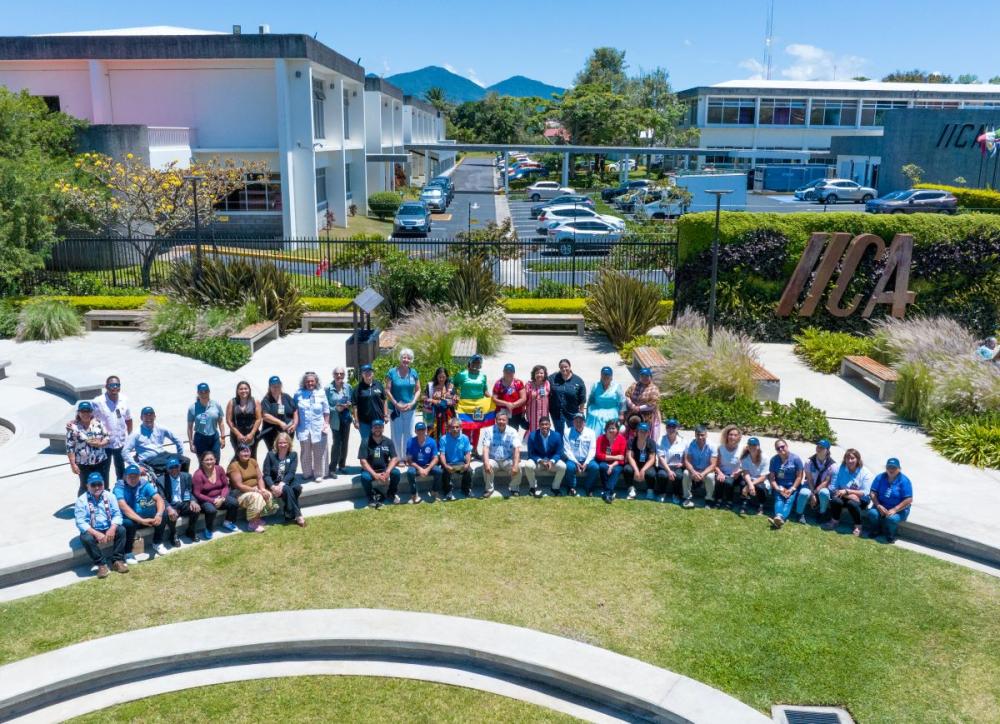With support from IICA, rural leaders from the Americas create a network that will improve cooperation and social and production development
San José, April 22, 2024 (IICA). With technical support from the Inter-American Institute for Cooperation on Agriculture (IICA), rural leaders from the Americas are to set up a network to promote actions aimed at strengthening and empowering rural territories and their stakeholders, and prioritizing their role as guarantors of food and nutrition security and guardians of the planet’s biodiversity.
The decision, taken by more than 40 leaders from 21 countries and every region of the Americas (see list), was endorsed by the Director General of IICA, Manuel Otero, following intensive discussions and the sharing of experiences at the “First Meeting of Leaders of Rurality of the Americas: Strengthening Rurality through Sustainable, Resilient and Inclusive Production,” organized by the inter-American agency in San José, Costa Rica.
“The task now is for this meeting to become a dynamic network for concrete actions to move forward. We identified seven hemispheric actions to galvanize an extensive network through which the Leaders of Rurality will play a leading role and stay connected, with IICA serving as its secretariat,” Otero said.
The actions will focus on the promotion of cooperativism, the creation of a “seal” for family and peasant agriculture in the Americas to boost sales development, the establishment of a network of germplasm banks of native seeds, the systematization of data on examples of successful food production under conditions of water scarcity presented by some of the leaders, and other issues related to education, communication, and the role of agricultural technical schools.

“In addition to the digitalization of agriculture, we shall develop an extension strategy for rural communities, an area in which IICA has experience, and put together a catalogue of the hemisphere’s family farming products and then promote it in world markets. To seek funding for rural communities, we shall hold meetings with the International Fund for Agricultural Development (IFAD) and the CAF-Development Bank of Latin America and the Caribbean to discuss alternatives and what they can offer,” the Director General added.
At the meeting, the leaders attended presentations where they were able to interact with experts on different subjects. With Rattan Lal, head of the Carbon Management and Sequestration Center (C-MASC) at Ohio State University, they discussed the challenges for sustainable development. With Álvaro Lario, President of IFAD, they focused on the challenges for rural development. And with Ronald Guendel, Vice President of Smallholder Farming at Bayer Crop Science, they addressed sustainability and crop science issues.
The participants also discussed the opportunities offered by connectivity and the use of digital technologies to improve agriculture and rurality, following a talk by Federico Bert, the head of IICA’s Agrifood Digitalization Program, and Sandra Ziegler, an Institute consultant. The question of financing for sustainable development was presented by Florentino Fernández, Advisor for Mexico and Central America of the CAF-Development Bank of Latin America, while the former Minister of Agriculture of Brazil, Roberto Rodrigues, a world expert on the cooperative movement, spoke on the subject of cooperatives and associative enterprises.
As head of the inter-American agency specializing in agriculture and rural development, Manuel Otero promised to present details of the main outcomes of the meeting of leaders and the creation of the network at the next Regular Meeting of IICA’s Executive Committee, which is scheduled to take place on July 23-24 in San José, Costa Rica.
The Executive Committee, one of IICA’s governing bodies, meets once a year. It is made up of 12 Member States, elected for two-year periods on the basis of the principles of partial rotation and equitable geographical distribution.
“IICA is a dynamic, action-oriented institution with transformative strength, and we must continue to champion the wellbeing of the rural territories of the Americas,” Otero added.
For their part, the leaders proposed working on actions to recognize, save and preserve biodiversity, gender equity, efforts to attract young people to agricultural activities through the use of technology, training, the preservation of ancestral knowledge used in agriculture, the inclusion of people with disabilities and older adults in farming enterprises, and the use of biomaterials, among others.
This first Meeting of Leaders of Rurality organized by IICA brought together a heterogeneous group of people that included family farmers, medium-sized producers, peasants, members of indigenous communities, teachers, promoters of cooperatives, students, community leaders, agents of innovation and technology in rural areas, and activists who advocate for a leading role for women and young people in agricultural activities.
All the members of the group have been recognized as Leaders of Rurality under an initiative launched in 2021 by IICA bearing that name, to shine the spotlight on people who perform a unique dual role in their daily activities, as both guarantors of food and nutrition security and guardians of the planet’s biodiversity.
The Institute’s “Soul of Rurality” award recognizes men and women who leave their mark and make a difference in the rural areas of the Americas through their contribution to the production of healthy, accessible foodstuffs, the wellbeing and rootedness of the rural population, and environmental conservation.
The participants also made technical visits to agricultural operations in Costa Rica to learn about innovative developments in regard to organic cocoa, organic sugar, sustainable goat production, coffee, and applied research processes for the validation of agricultural and digital technologies.
More information:
Institutional Communication Division.
comunicacion.institucional@iica.int